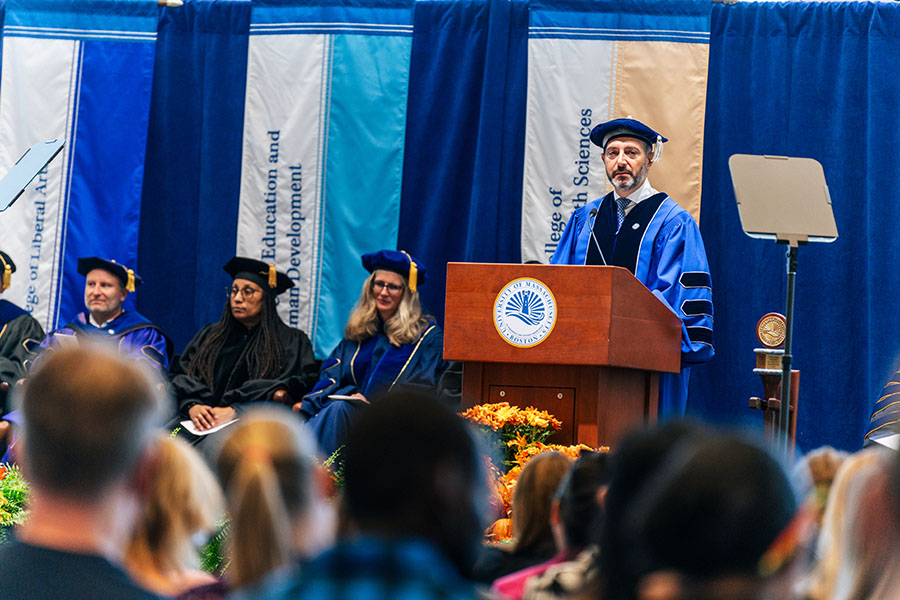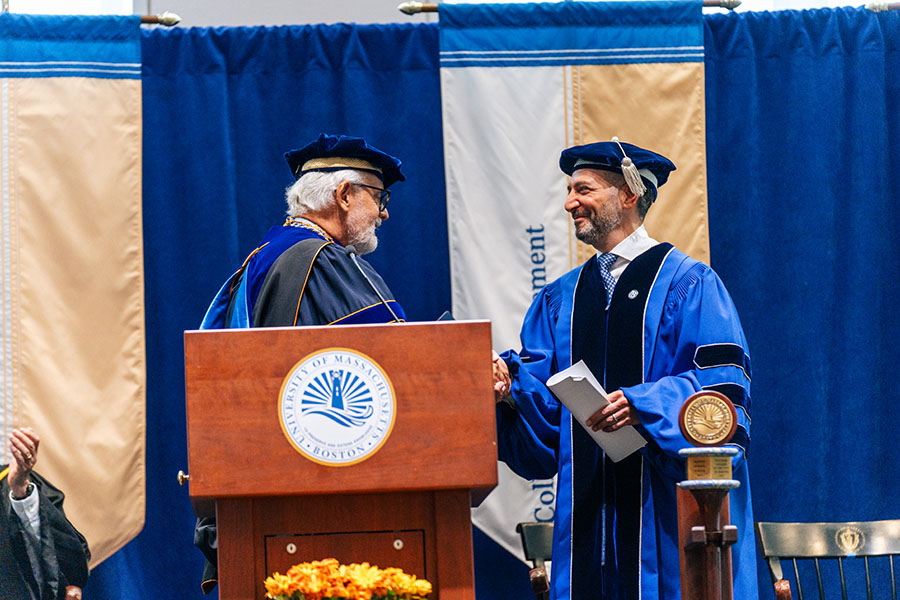- Home
- News
- Recent News
- Avak Kahvejian Offers a Path to Innovation and Inspiration at Convocation
Life Sciences Inventor, CEO Avak Kahvejian Offers a Path to Innovation and Inspiration at Convocation
Two decades ago, Avak Kahvejian was busy completing his PhD in biochemistry, and feeling a bit disillusioned as he struggled with a lack of purpose. His mRNA research focus was important, but obscure, and as he recalls, few people had much interest in the work he was doing.

Years later, as a partner at the bioplatform innovation company Flagship Pioneering, Kahvejian was present for the founding of LS18. Today known as Moderna, the company became a household name during the pandemic by generating a safe and effective COVID-19 vaccine at record speed, saving millions of lives.
“Turns out my graduate work in early mRNA research wasn’t so meaningless after all,” Kahvejian said. “To the contrary, it involved what would become one of the most consequential biotechnologies of our lifetimes. … Moderna generated a safe and effective COVID-19 vaccine at record speed — a feat only possible because its mRNA bio platform, 10 years in the making, was already up and running.”
The life sciences inventor, entrepreneur, and CEO encouraged students, faculty and staff at UMass Boston’s Fall Convocation to ask bold questions, experiment, and explore, explaining that “breakthroughs arise from new experiences that drive new insights and connections.”
“This is the way to innovation. Even if it feels like you’re wasting your time, keep an open mind.”
Kahvejian spoke of how UMass Boston’s mission of creating new opportunities for students from diverse backgrounds to reach their full potential resonates with his own journey. Kahvejian was an infant when his Armenian family left the Civil War in Lebanon for Canada. He said his family left everything behind except their education, and he credits his father’s engineering training with helping him get back on his feet much faster than he otherwise would have.
Years later, he took advantage of the Canadian education system to get a PhD in biochemistry, which ultimately led him to Boston, which was then quickly becoming the epicenter of the biotech revolution.
“I am an immigrant, and because of this I especially appreciate all that UMass Boston does to ensure that students from all places and walks of life have a better chance to thrive and to reach their full potential,” he said. “At UMass, you are making such lives possible for a new generation of students, and I am proud to stand with you.”

While biotechnology can seem complex and distant to many, Kahvejian urged the UMass Boston community to leverage their proximity to South Line, a life sciences innovation hub where several biotech companies, including those Kahvejian co-founded at Flagship, are pushing the boundaries of scientific discovery. The complex is less than a mile walk from the university’s Campus Center.
“Since meeting [Chancellor Marcelo Suárez-Orozco], I've come to see how much UMass Boston and Flagship have in common. We share a commitment to inclusive excellence and big ideas. We know that progress happens when we work together in ways both large and small,” he said.
He spoke of how UMass Boston is collaborating with Abiologics, the newest of the three Flagship companies operating out of South Line, sharing specialized equipment along with expertise.
Flagship’s mission is to transform healthcare and sustainability; they have created, resourced, and founded more than 100 bioplatform companies.
“And to the students here today, now that Flagship’s on your radar, perhaps some of you will come to work at Flagship or one of its companies or in the larger neighborhood of Boston-area life sciences,” he said.
He drew parallels between physical neighborhoods and the broader network of disciplines and industries, emphasizing the importance of collaboration and shared resources.
“I've been talking about physical neighborhoods—the areas where we live and work—but they're not the only kind. Cultures, religions, communities of interest, these too are neighborhoods. The same is also true of academic fields. Here at UMass Boston you have many of these, from business to biology-- smaller neighborhoods within the larger village or city,” he said.
“If you're anything like me, you likely feel most at home in one field or maybe two, but here's the thing: If we never leave our block, we miss out on opportunities just around the corner. This is not only bad for us, it's also bad for the world,” he said.
And he urged the crowd to take full advantage of what the city has to offer.
“It can be hard to fully appreciate what’s happening in Boston. On the surface, it can look just like a bunch of nondescript buildings, and the molecules we focus on are literally invisible,” he said. “Yet throughout this remarkable community, breakthroughs are in the making. While they’re not always something you can point to — like a rocket or an electric car — together, they have the potential to transform the world.”
